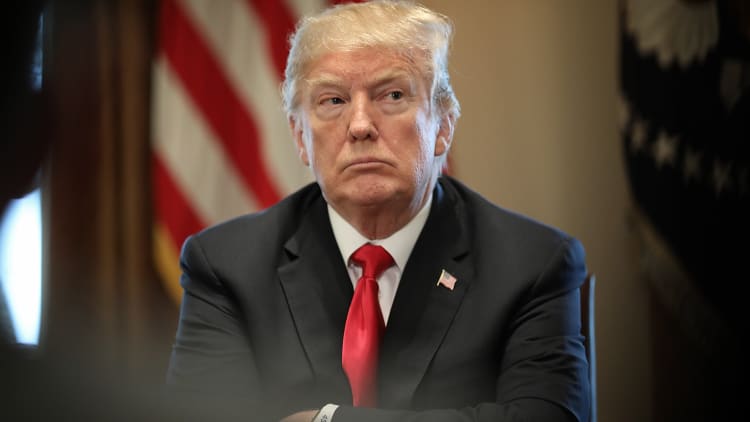
More than one hundred Republican members of Congress on Wednesday signed a letter "urging" President Donald Trump to trim down his proposed tariffs on steel and aluminum.
"We urge you to reconsider the idea of broad tariffs to avoid unintended negative consequences to the U.S. economy and its workers," the GOP lawmakers said in the letter.
The letter, released by the House Ways and Means Committee, comprised signatures from 107 Republican U.S. representatives.
In the letter, Republicans applauded the Trump administration's successes on tax reform, but warned that "adding new taxes in the form of broad tariffs would undermine this remarkable progress."
Read more
Here's how Congress can stop Trump's tariffs – if lawmakers want to
Trump's tariff plan blows up party divisions in critical Pennsylvania special election
Exxon CEO: Trump tariffs move us 'in the opposite direction' from tax cut and deregulation benefits
Rather than impose tariffs of 25 percent on all steel imports and 10 percent on all aluminum imports, the Republicans called on Trump to focus on "China's unfair practices" if tariffs cannot be avoided.
In a statement accompanying the letter, Ways and Means Committee Chairman Kevin Brady, R-Texas, said, "We're urging the President to tailor these tariffs so American businesses can continue to trade fairly with our partners, sell American-made products to customers all over the world, and hire more workers here at home."

Trump announced the steel and aluminum tariffs on Thursday. Rather than levying new taxes on specific types of products imported from individual countries, the new proposal would apply a global tariff on whole industries.
To pass the tariffs, Trump is relying on a 1962 law allowing him to sign the new taxes into law by executive order. The law was last applied in the early 1990s, and it has not been pursued by an administration since 2002.
The Wednesday letter is not the first instance of Republicans speaking out against Trump's protectionist trade proposal.
House Speaker Paul Ryan, who did not sign the Committee's letter, this week said he was "extremely worried"about the consequences of a potential trade war. Ryan's office did not immediately respond to CNBC's request for comment.
Mitch McConnell, the Senate majority leader, also said he has "genuine concerns" about the policy.
Stocks slid lower after Gary Cohn, Trump's top economic advisor who supported free trade policies, announced his resignation on Tuesday evening. But the market recovered slightly after press secretary Sarah Sanders said the tariffs may be less severe for Canada and Mexico "based on national security."
WATCH: If Trump proceeds with tariffs, investors should be on alert



